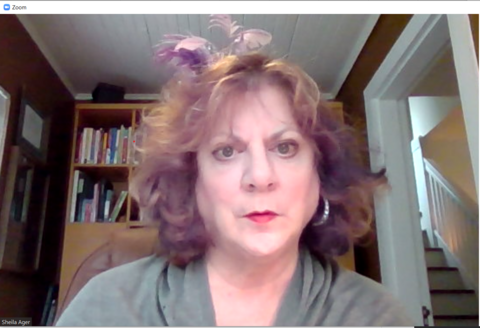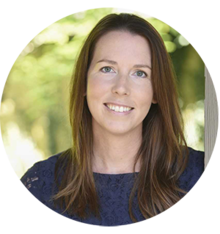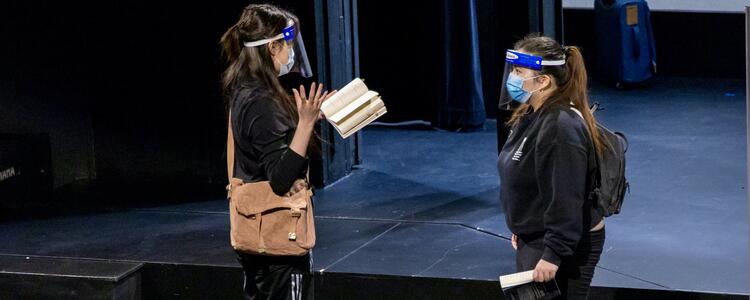
newsletter for faculty and staff | spring 2021
Springing from a good place
I just went back and looked at my April 2020 Inside Arts piece, and I see that most of it was about toilet paper. Who knew that a year later we would still (again) be in lockdown?
The toilet paper supply chain appears to have stabilized somewhat, though I have noticed that I now tend to buy two packs ahead instead of just one, the way I used to. Lingering apprehension, I expect. The vaccines are indeed rolling out (I get my first shot next week), though we all know that it will be months before we’re considered fully vaccinated in the Region. At the same time, with cases on the rise in recent weeks and the Variants Of Concern (VOC, our newest acronym) popping up everywhere, people’s anxiety levels are naturally volatile. And while the past year has shown us that, for Ontario at least, lockdown seems the only way to control the spread, it inevitably brings with it all the economic pressures on our local businesses, not to mention the stress of continued working from home in homes that for many are now feeling pretty overcrowded.
Considerably increased live activity
My rhetorical strategy here – which you may already have discerned – is to start with all the things that contribute to making us feel gloomy right now, so that we can acknowledge them and try to focus on moving past them. There is one challenge coming up that I haven’t yet acknowledged, but since it springs from a good place, I didn’t want to include it in things that one might call gloomy. You all know by now that the Fall term this year is going to see considerably increased live activity on campus, activity that will involve all of us, staff, faculty, and students alike. “Considerably increased live activity” is, I confess, a rather deliberately non-quantifiable way of putting things, since we don’t know just yet how the numbers will shake out, whether in return to work on campus or in live classroom offerings. But we do know for sure that the campus will be a much livelier place this fall.
It’s just fine to be human
However, it still won’t represent a return to “normal”, not even the “new” post-pandemic normal. We’ll still be carrying out the precautions that people have now become accustomed to, such as masking and social distancing. In order to ensure distancing in live courses, classrooms will only be filled to 50% capacity (every other seat). Inevitably, because of the need for distancing and because many of our students may still not be prepared to be on-campus, much, perhaps even the majority of our teaching will continue to be remote. But we’re committed to providing at least some live action for all of our students who are able to be here. So I do acknowledge that planning for the Fall 2021 term is going to be complex. Our Associate Deans, Chairs, Associate Chairs, scheduling officers, academic advisors, and other staff, and every individual instructor in the Faculty have all been working so hard since the pandemic began to give our students the best possible experience.
I know how tired everyone is, and I understand that we’re asking you to prepare for a term that will be different again from the ones we’ve experienced so far. When you think about getting ready for it, please remember something I said in an update I sent a couple of months back: it’s just fine to be human, and don’t let the perfect be the enemy of the good – “good” can be good enough, so go easy on yourself and give yourself a break.
Glad we didn’t know then
And perhaps we can keep our eyes on the prize by reflecting that the Fall of 2021 will in all likelihood be the last term that will need to have so much in the way of special arrangements. Although we all know that we will be featuring more remote elements in our teaching moving forward, as a simple and natural consequence of all that we’ve learned during the pandemic, the Winter of 2022 should be as close to “normal” as we can imagine. Perhaps it will also help to reflect that, no matter what, we are already a year closer to the end of the pandemic. That may seem like
a sort of fatuous and goofy statement, but I was prompted to think of it as I myself reflected on the question, “What if we had known last March how long this was going to last?” I know I would have found it harder to bear, so I’m glad I didn’t know then what the shape of this past year was going to be.

Yes, I'm still right here, though not always wearing the fascinator.
I will probably cry; I’m warning you now
Before I sign off, I wanted to say a couple of words about the current issue of Inside Arts. As you’ll see, we’re celebrating this year’s winners of the Arts Awards for Excellence in Teaching, Research, and Service. Personally, I can’t wait until we can all get together and have a party to celebrate not only this year’s winners, but last year’s winners as well – and just celebrate all being together again. (I will probably cry; I’m warning you now.) I also wanted to point to the COVID campus safety accolades, to members who’ve really gone above and beyond during this difficult year to keep our work places safe.
And finally, many, many thanks to all of you in the Faculty, for your diligence, your patience, your endurance, and your continued care for the Faculty’s mission during these parlous times.
Congratulations to the 2021 Arts Award recipients
It was a bumper crop year for Arts Award nominations. Congrats to all the nominees for their excellence (you know who you are). And while we must once again postpone our annual Celebration of Arts event, let’s celebrate these 12 outstanding People of Arts* and their contributions through service, teaching and research that extend from our Faculty to the University and into the world.

Arts Award for Excellence in Service

Rita Cherkewski (Graduate Studies and Research)
If you work in the grad world at the University of Waterloo, you know Rita. She is one of the most respected graduate officers on campus and went above and beyond to assist many during the remote shift. Her exceptional service and unwavering commitment to graduate students is the embodiment of what makes UWaterloo and the Faculty of Arts great.

Richard Eibach (Psychology)
Over seven years as associate chair, Richard has been extraordinarily devoted to Psychology's huge undergraduate program. Every decision he makes has student experience at its core. His dedication extends beyond campus, addressing violence and discrimination experienced by members of LGBTQ2+ communities. He is a cherished instructor, advocate, colleague and friend to everyone, and most especially to students.

Kayla Lorentz (Arts Undergraduate Office)
During the shift to remote learning, and in Kayla’s first few months as Manager of Academic Advising, she had to handle an astounding number of truly unprecedented challenges. With phenomenal grace and good judgement, she takes great care to balance students’ needs for more complex support with the well-being of the Arts advising team.

Kim Nguyen (Communication Arts)
Kim provides exceptional service and leadership within the university, including work on the FAUW Equity Committee, the President's Anti-Racism Task Force, W5’s Writing Retreat, and as Faculty representative for W3+, and the Indigenization Working Group. Notably, she led transformational changes in the W3+ organization to become more inclusive of gender, racial and sexual diversity.
Arts Award for Excellence in Teaching

Frankie Condon (English)
Frankie teaches out of her own commitments to antiracism and social justice. Her compassion for students, her understanding of the events that befall them, and her implicit belief that they can succeed helps them cope when circumstances threaten to overwhelm. She is one of the department’s most sought-after supervisors and instructors.

Rebecca MacAlpine (History)
An outstanding doctoral candidate in History, Rebecca is a dedicated, disciplined, and thoughtful student, and she brings those same characteristics to her roles as TA, instructor, and most recently departmental TA Mentor and Coordinator. She is innovative in her approaches to teaching and always excited to find new and effective ways to engage students and play to their strengths.

Janelle Rainville (Communication Arts)
For a variety of courses over the past five years, Janelle’s instructor evaluation scores have been outstanding. She makes strong contributions to course development, structure and delivery, and is exceptionally committed to accessibility. She is a constant pillar of support and encouragement whose dedication to students, both current and alumni, is unrivaled.

James Skidmore (German and Slavic Studies)
Skid’s contributions to teaching excellence as a teacher, supervisor, Arts Teaching Fellow, and online learning expert are well known in Arts and across campus. While many were scrambling to pivot to an online environment, he gave his time and expertise to support colleagues across the university and at other universities via workshops, webinars and personal consultations to help them create student-centred and engaging online courses. (*Thanks to Skid for the collective moniker.)
Arts Award for Excellence in Research

Roy Brouwer (Economics)
In his role as excutive director of the Water Institute and through his own research, Roy embodies the ideals of the University of Waterloo: with a focus on environmental economics, his work and contributions are highly interdisciplinary, international, and addresses real and pressing problems relevant to societies and life on the planet.

Stephanie Denison (Psychology)
Stephanie is an outstanding developmental psychologist who has made major contributions to our understanding of cognitive development. Viewed as a rising star by colleagues near and far, her work has, among other impacts, led psychologists to rethink how social and statistical knowledge, seemingly disparate areas, are connected from early in life.

Dan Henstra (Political Science)
Dan’s research on climate disaster risk and preparedness has had a significant impact on public policy and often attracts major media coverage. Whether one considers publications, success in winning competitive research grants, or impact on public policy his performance has been extraordinary.

Imre Szeman (Communication Arts)
Imre’s research accomplishments throughout his career have been outstanding. His inspiring interdisciplinary research covers energy humanities, environmental studies, and social and political philosophy, which is actively applied through his work with the Petrocultures Research Group, the International Panel on Behavior Change, and the Canadian International Council, and more. In 2020, he reached the remarkable career achievement as Fellow of the Royal Society of Canada.

Making COVID-safe spaces on campus
» Shared by Stacy Reda, Operations Manager
>While Stacy Reda was working on COVID compliance for research and department space, she was struck by several individuals who stood out for having gone above and beyond in their responsibilities to keep their colleagues, students and others who visit their spaces safe. “Their work has been extremely challenging,” said Stacy, “and it’s awe-inspiring that they are managing to meet and exceed the challenges set before them.” Here, Stacy mentions three of these amazing individuals.
Adam Glover (Manager, Media and Studios, Fine Arts): Adam is managing the Fine Arts graduate students on a research plan so they can meet their milestones. He has the clearest and most conscientious plan I’ve seen (it was even praised by the Office of Research). He has had to make many revisions and has gladly complied with any safety directive given. He has a staggering amount of space and equipment to manage and yet he’s pulled it off. He even built individual grad student niches with 10 foot walls so that the students could have space to keep working on their projects. When I go to his area for inspections, grad students seek me out to tell me how much they appreciate him.
Marjory Phillips (Director, Centre for Mental Health Research and Treatment, Psychology): Marjory has worked extremely hard to make sure the CMHRT remained in operation to continue treating their patients and training their students. She has been extremely thorough in safety planning, and meticulous in their cleaning processes.
You can tell, while speaking with her, that she truly cares about the community she serves and will go above and beyond to offer them the care that they need — and she has! The CMHRT is in the unique situation in Arts to offer in person face-to-face care to community members. She has had to implement strict screening protocol, extensive cleaning protocol and training, and coordinate installation of plexiglass shields and various other equipment.
Janelle Rainville (Production Manager, Theatre and Performance, Communication Arts): Janelle is doing an exceptional job trying to navigate for her program’s on-campus courses in Theatre and Performance during a lockdown. She is an extremely flexible and creative trouble-shooter. In a very short amount of time, she has had to come up with plans to scale back course occupancy (coming up with options for instructors to cohort the classes or work asynchronously during lockdown), moving lockers to allow students to store personal items, and even securing an exclusive area for the students to safely have lunch when it turned out that they would have a very long break between online classes. She worked extremely hard, working creatively through a myriad constraints, to ensure the program’s annual live production (scenes from carried away of the crest of a wave) could proceed safely and effectively via livestreaming.
(Read co-op student Eloise Fan’s story about that production: The show must go on. The photo above shows students Yuru Su and Qing Wen in researsal.)
Developing our new Strategic Plan — next steps
If you read Dean Sheila Ager’s Strategic Plan update email last week, you know that the strategic planning process is soon moving forward with working groups. Here is a snippet of what Sheila wrote, and you can visit the Developing our new Strategic Plan webpage for past, current and future updates, and learn how you can contribute ongoing feedback.
Working groups
With working group membership suggestions from department chairs and staff supervisors, I am currently assembling four strategic planning working groups, each to focus on a thematic pillar, or “area of change” as we have come to call them:
- Faculty Identity
- Governance and Organizational Change
- Student Experience and Success
- Connection, Community and Collaboration through Interdisciplinarity
Each working group will be co-chaired by an Associate Dean and a staff or faculty representative, and will include faculty, staff, and student members. Once the working groups are fully populated, we will inform the Faculty of their membership.
The working groups will define the specific goals and implementation objectives of their area of change, along with outcome measurements. This work will form the basis of our final plan. We expect the working group phase to run from this April until October 2021, and throughout that phase I will have regular update meetings with the working group co-chairs.
Feedback?
Inside Arts is published each term. Comments, ideas, and submissions are always welcome. Please contact Wendy Philpott.
